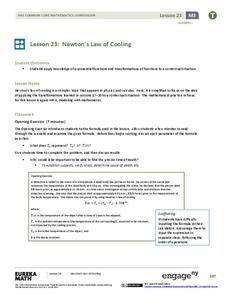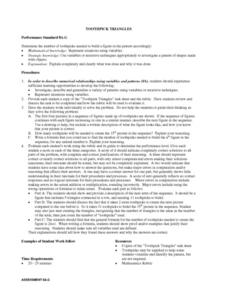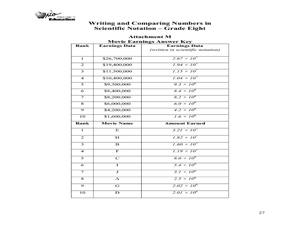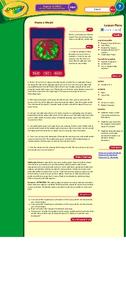EngageNY
Newton’s Law of Cooling
As part of an investigation of transformations of exponential functions, class members use Newton's Law of Cooling as an exponential model to determine temperature based on varying aspects. The resource makes comparisons between...
Curated OER
Toothpick Triangles
Students draw a chart (included in the lesson) to use with their investigation. They review terminology of triangles and receive toothpicks to use in the lesson. Beginning with three toothpicks, students form a triangle. They complete...
Charleston School District
Review Unit 1: Exponents
What will be on the test? The resource provides comprehensive review items for the content of the unit on exponents. The resource divides the sections in the order you present the lessons during the unit.
EngageNY
Congruence Criteria for Triangles—ASA and SSS
How do you know if a pair of triangles are congruent? Use the lesson to help class members become comfortable identifying the congruence criteria. They begin with an exploration of ASA and SSS criteria through transformations and...
University of Georgia
Using Freezing-Point Depression to Find Molecular Weight
Explore the mathematical relationship between a solvent and solute. Learners use technology to measure the cooling patterns of a solvent with varying concentrations of solute. Through an analysis of the data, pupils realize that the...
Curated OER
The Three M's of Statistics: Mode, Median, Mean
Young mathematicians use the Visual Thesaurus to define mean, median, and mode. In this mean, median and mode activity, learners use online sources to find the definitions of mean, median, and mode before applying the concepts to a class...
K12 Reader
Classifying Triangles
Bring math and reading informational text together with a reading comprehension lesson. After kids read about isosceles, scalene, and equilateral triangles, they answer five comprehension questions to demonstrate how they can use context...
West Contra Costa Unified School District
Parallel Lines Cut by a Transversal
Parallel lines seem so right for each other. It's too bad they'll never, ever meet. Learners use tracing paper to discover relationships among angles formed by two parallel lines cut by a transversal. They apply this information to find...
Curated OER
Cold, Clouds, and Snowflakes
Students explore satellite data and graphing. In this weather data analysis math and science lesson, students analyze NASA satellite data to draw conclusions about geographical areas where precipitation might have happened. Students...
Baylor College
Food for Kids
Immediately capture the attention of your class with the smell of freshly popped popcorn in the sixth lesson of this series on the needs of living things. Young scientists first use their senses to make and record observations of...
Mathematics Assessment Project
Estimating Volume: The Money Munchers
Don't stuff money under your mattress. To find out why learners first complete a task determining how $24,000 in cash would affect the height of a mattress and whether this same amount would fit into a suitcase of given dimensions....
Curated OER
What's the Frequency, Roy G. Biv?
Introduce starting space scientists to the electromagnetic spectrum, expecially the portion of visible light. Teach them about wavelength and frequesncy. Then give them a roll of adding machine tape and a manila folder to make a...
Teach Engineering
Air Pressure
Investigate what is pushing on us. An intriguing lesson has pupils calculate the amount of force on various squares due to air pressure. Using the data, individuals create a graph in the third lesson of the Up, Up and Away unit...
Curated OER
Moon Mining
Go on a moon mining expedition from the safety of your classroom with this space exploration simulation. Using simple models of the moon's surface prepared ahead of time by the teacher, young scientists are challenged with locating and...
Baylor College
Lungometer
Life science learners construct lung-o-meters from gallon-sized milk jugs and then measure their lung capacities. For older students, have them graph the vital lung capacities of each person in the class. Cross-curricular pieces are...
Bowland
My Music
Scholars investigate how the tempo of music affects heartbeats. Groups develop hypotheses about music and its connection to heartbeats before carrying out an experiment. They analyze and present data from their investigations.
Teach Engineering
Better By Design
Which modification is the best? Using the scientific method, pairs determine the effects of each control surface on the distance of a glider's flight. The activity, section 16 in a 22-part unit on aviation, allows pupils to gain a better...
Ohio Department of Education
Writing and Comparing Numbers in Scientific Notation-Grade Eight
Explore scientific notation in this mathematics lesson. Young mathematicians explore multiple representations of large number in scientific notation through the use of models, visual representation and expanded form. The lesson provided...
Scholastic
Study Jams! Mean/Average
Join Zoe as she calculates the average number of points RJ scored in his basketball games. This step-by-step presentation clearly models the procedure for finding the mean of a data set, including examples with both whole number and...
Mascil Project
Packaging
Wrap up an engineering lesson with a worthwhile project. An engineering design task challenges groups to develop a package for a pharmaceutical company given constraints on the volume. Learners then create a presentation to highlight...
Curated OER
Skate Borders
Elementary schoolers explore how making different rectangular shapes with the same perimeter has an affect on the area of those shapes. Learners use the worksheet embedded in the plan to design their own skateboarding track. They use...
Shodor Education Foundation
Algorithm Discovery with Venn Diagrams
Here is a lesson that takes an interesting approach to analyzing data using box and whisker plots. By using an applet that dynamically generates Venn diagrams, the class forms a strategy/algorithm for guessing the rule that fits...
Curated OER
Weave a Wreath
Students follow directions to complete a multi-step process that results in an attractive holiday decoration. In this Christmas art activity lesson, students employ simple measuring and weaving techniques and experiment with the negative...
Baylor College
How Much Water Do Humans Need?
Physical or life science learners measure the amounts of water eliminated by intestines and the urinary system, and the amounts lost via respiration and perspiration. In doing so, they discover that the body's water must be replenished...























